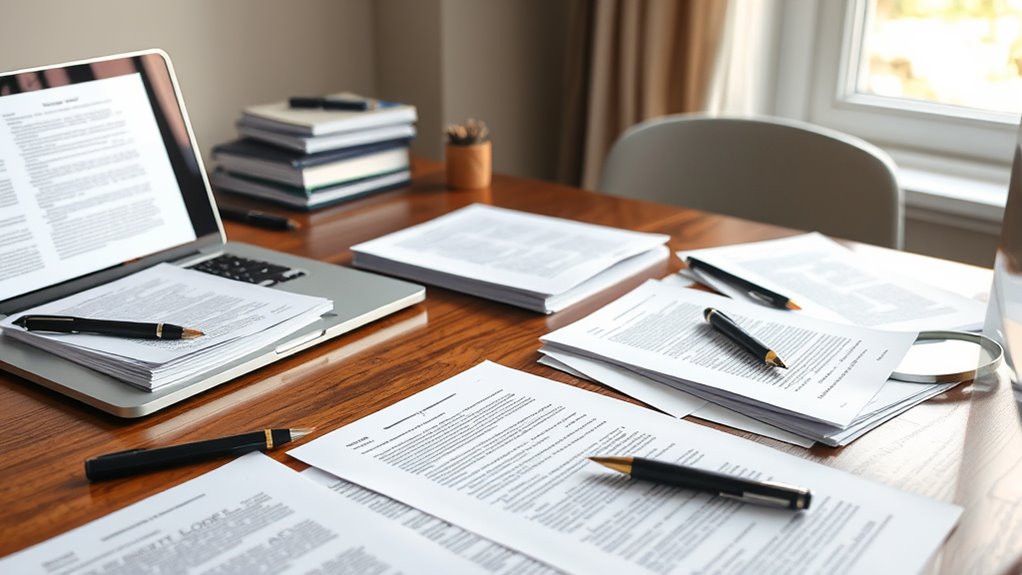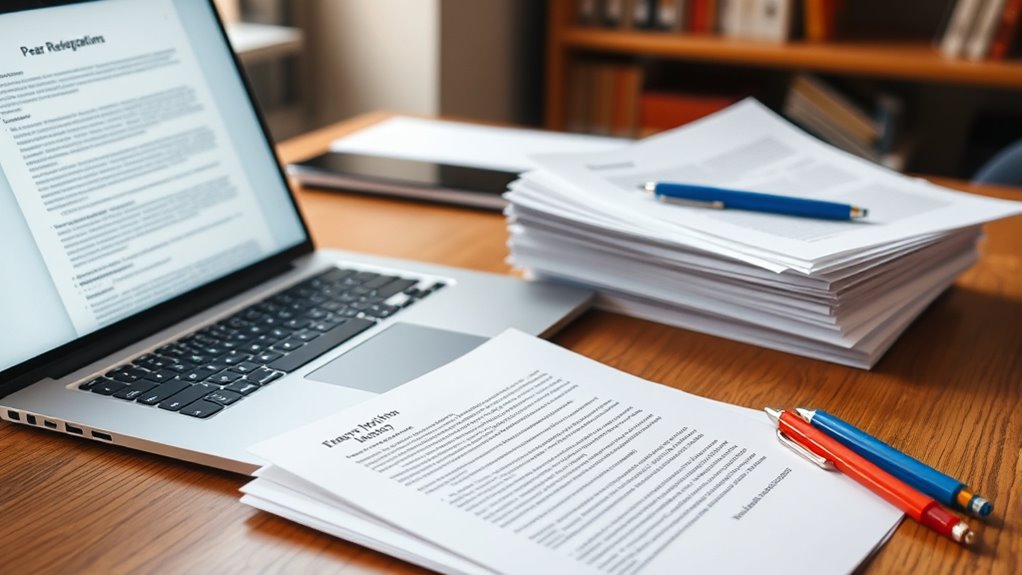To craft peer review response letters like a pro, you should approach each comment with professionalism and care, demonstrating that you’ve thoughtfully considered feedback. Be clear about how you’ve revised your manuscript, specifying textual changes or added data, and explain your reasoning when you disagree. Maintain a respectful tone, showing your commitment to improving your work. Mastering these strategies will help you communicate effectively and increase your chances of acceptance—keep going to discover more expert tips.
Key Takeaways
- Address each reviewer comment specifically, demonstrating thorough understanding and appreciation of their feedback.
- Clearly describe all revisions made, including textual changes, added data, or clarifications for transparency.
- Maintain a respectful, professional tone, even when politely disagreeing with certain suggestions.
- Use organized, point-by-point responses to show careful consideration and enhance clarity.
- Highlight how revisions improve the manuscript’s quality and communicate your commitment to scholarly excellence.

Have you ever wondered how to craft an effective peer review response letter? If so, you’re not alone. Responding professionally to reviewers’ comments can feel intimidating, but mastering this skill is essential for improving your work and advancing your scholarly reputation. The key is to approach your response with clarity and a collaborative attitude, especially when providing constructive feedback. Your goal should be to demonstrate that you’ve carefully considered each point, made necessary revisions, and are committed to enhancing your manuscript. When addressing reviewers’ suggestions, focus on revision strategies that show you value their input while maintaining your voice and research integrity. Be specific about how you’ve incorporated their feedback—whether you’ve made textual changes, added new data, or clarified key arguments. This approach reassures reviewers that their comments have been taken seriously, and it highlights your professionalism. Remember, revision strategies are about more than just fixing errors; they’re about refining your work to communicate more effectively. For example, if a reviewer points out a confusing section, your response should detail exactly what you changed to improve clarity—perhaps rephrasing a paragraph or adding a supporting figure. When providing constructive feedback within your response, stay respectful and constructive, acknowledging valid points without sounding defensive. If you disagree with a suggestion, explain why politely and support your reasoning with evidence or references. This not only shows critical thinking but also fosters a constructive dialogue. Keep your responses organized: address each reviewer comment individually, quote their remarks for clarity, and follow with your response. This structure makes it easier for editors and reviewers to see that you’ve addressed all concerns systematically. When revising, consider whether the suggested changes genuinely improve your manuscript or if alternative adjustments might be better. Sometimes, a reviewer’s comment may require a different approach than what they initially proposed. Be transparent about these decisions in your response letter. Additionally, understanding the importance of efficient communication can help you craft clearer and more effective responses, ultimately increasing your chances of acceptance. Ultimately, your aim is to present a response that is professional, thoughtful, and thorough. Doing so not only increases the chances of your manuscript’s acceptance but also helps you grow as a researcher. By employing effective revision strategies and offering constructive feedback, you demonstrate your commitment to scholarly excellence. Remember, the response letter is an opportunity to showcase your dedication to quality and your ability to collaborate with reviewers constructively. Approaching it with a positive, open-minded attitude will make the process smoother and more productive for everyone involved.
Frequently Asked Questions
How Do I Handle Conflicting Reviewer Comments?
When you face conflicting reviewer comments, you need to carefully consider each critique and find a way to balance the feedback. Focus on the comments that align with your research goals and strengths, and explain your reasoning clearly when addressing dissenting opinions. Be respectful and transparent, showing you’re open to improvement while maintaining your work’s integrity. This approach demonstrates your ability to balance critique effectively and strengthen your manuscript.
When Should I Request a Reviewer Re-Evaluation?
Think of your manuscript as a ship steering through choppy waters; knowing when to request a re-evaluation is vital. You should request reconsideration when reviewer comments are unclear or seem to overlook key points. Timing matters—wait until you’ve thoroughly addressed all feedback before asking for a re-evaluation. If new evidence or significant revisions are made, requesting reconsideration at that moment can help guide your paper to smoother sailing.
How to Address Negative Feedback Diplomatically?
When addressing negative feedback, you should acknowledge the reviewer’s expertise to show respect and understanding. Maintain a professional tone by calmly explaining your perspective and providing evidence or clarifications where needed. Avoid defensiveness, and instead, express appreciation for their insights. This diplomatic approach demonstrates your willingness to improve while respecting their critique, ultimately strengthening your response and fostering positive communication.
What if Reviewers’ Suggestions Compromise My Research Integrity?
Facing reviewers’ suggestions that threaten your research integrity feels like steering through a minefield. You must prioritize ethical dilemmas and uphold research transparency, even if it means defending your methods firmly. It’s essential to communicate clearly why certain suggestions compromise your principles, backing your stance with evidence. Remember, maintaining integrity isn’t just about personal ethics; it safeguards the credibility of your work and the scientific community. Stay honest, respectful, and firm.
How Long Should My Response Letter Be?
When deciding how long your response letter should be, aim for concise writing that clearly addresses each reviewer comment. Keep your tone professionalism throughout. Typically, your response should be thorough but not overly lengthy—about one to two pages or around 500 words. Focus on directly answering concerns, providing specific revisions, and maintaining clarity. This balance shows respect for reviewers’ time while effectively communicating your responses.
Conclusion
By carefully crafting your peer review response letter, you show that you’re on top of your game and open to constructive feedback. Remember, a well-written reply can turn critics into allies and strengthen your work. Don’t forget, when the going gets tough, the tough get going—so stay confident and keep polishing your responses. With these tips, you’ll be able to navigate the process smoothly and leave a positive impression that lasts.










